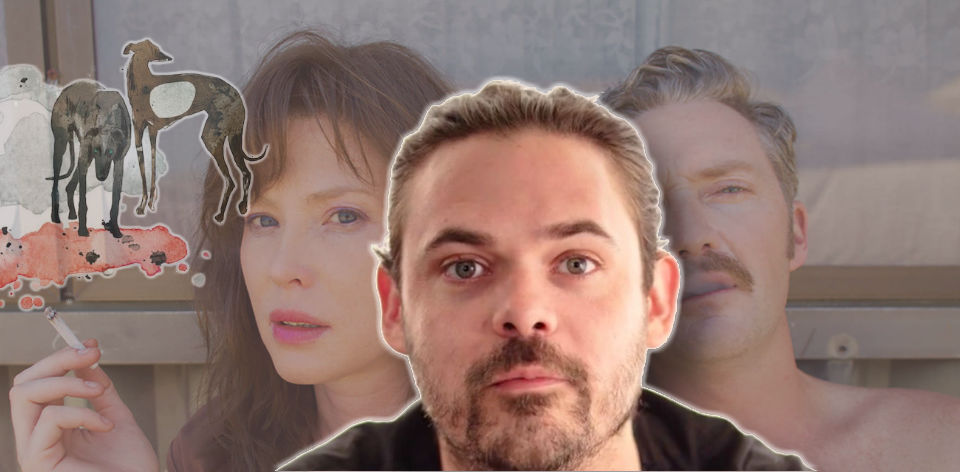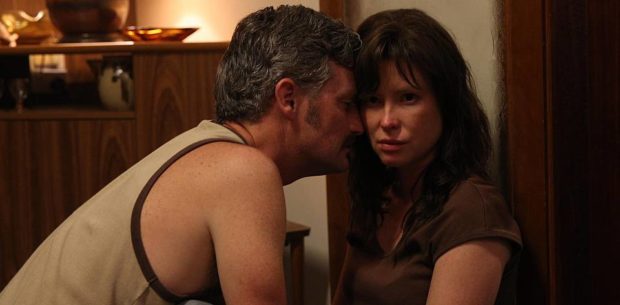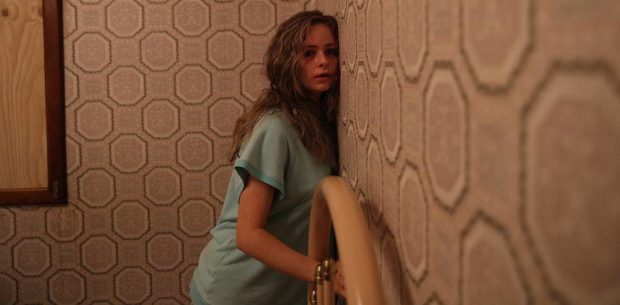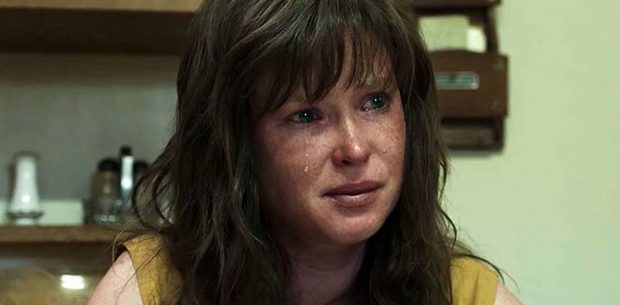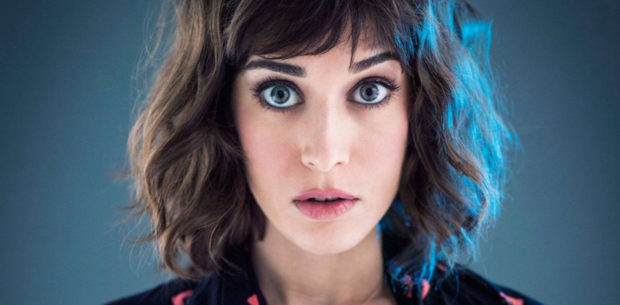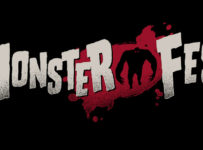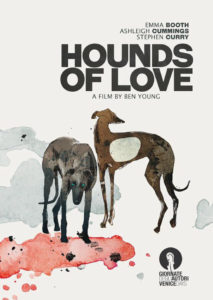 Australian filmmaker Ben Young has just returned from Europe, where he was shooting EXTINCTION for Universal. The sci-fi studio thriller is a stark contrast to his most recent release, the Australia serial killer film HOUNDS OF LOVE.
Australian filmmaker Ben Young has just returned from Europe, where he was shooting EXTINCTION for Universal. The sci-fi studio thriller is a stark contrast to his most recent release, the Australia serial killer film HOUNDS OF LOVE.
Set in Perth, Western Australia during December 1987, seventeen year old Vicki Maloney (Ashleigh Cummings) is heading out to a party when she is lured into the home of serial killer couple John (Stephen Curry) and Evelyn White (Emma Booth). As a series of humiliating tortures and ultimately death await her, she begins to view the power dynamic between the couple as something she can leverage to win her freedom.
Back in the country for a series of Q&As in Sydney, Melbourne and Perth this week, we spoke with Young about shooting HOUNDS OF LOVE on a low budget, the importance of music, and how that differed from working within the studio system. If you’re yet to see HOUNDS OF LOVE (and you really should) there are some minor spoilers ahead.
Congratulations on the release and reception of HOUNDS OF LOVE.
Thank you so much.
It’s a film I really enjoyed. I’m not sure enjoyed is the right word.
[Laughs] I don’t blame you for that.
Let’s just jump straight into that, then. It’s an uncomfortable film, but not an explicit one. At least I found the implications were more disturbing that what we saw. How do you make audiences connect with people who do unspeakable acts?
I think the I thing I tried to do was this: I just tried to make the “evil” people in the film as normal as possible. So when I was auditioning actors for it, there was the natural instinct that probably 90 percent of the actors had to walk in with [feigns ocker accent] a really heavy Australian accent, and played as bogans. I said ‘No, no, forget that. I want to hear it in your voice. I want this person to sound like your neighbour. I just want them to be a normal person. We made the choice very early on. I said to Emma [Booth] and Stephen [Curry], neither of you think your characters are evil, okay? Play them as if you’re a nice guy. I said, Steve, even when you’re doing those horrible scenes, speak to her like you think you’re seducing her. Give him the objective to befriend, rather than to terrify. I just tried to…play it against type as often as I could. To try and present more everyday qualities in these people.
It’s interesting you mention the authenticity, because Stephen Curry is someone who is, I guess, beloved by a lot of Australian audiences. He’s even in a Smiths chips ad at the moment. What did you see in him to cast him as John White? What quality was present there?
He’s so likable. The reality is that the Stephen Curry we think we know as the Australian general public is the Stephen Curry that we know. He’s one of the most likable, lovely humans on the planet. He’s just so fantastic to be around. He was not someone I thought of, he was a suggestion from the casting director. Then I just thought, ‘What a good idea.’ Because I had a fear with my own script, if the audience doesn’t buy Vikki getting in the car with him, the whole film falls over. And I thought, the context that an Australian audience is going to bring to John, if it’s Stephen Curry, is going to be hugely influential on how they interpret the film. I thought which Australian wouldn’t get in the car with Stephen Curry?
So that was a massive part of casting it. Psychopaths and sociopaths in real life, they are lovely most of time. You realise what they are trying to do, they are lovely because they’re trying to get something from you and manipulate you. So I thought it would be much more interesting to cast a lovely guy and get him to try and play this hideous character as gently as he could. I thought that would make it so much more real, and so much more confronting in its own way. So that’s what we were trying to do.
When you talk about that authenticity as well, one of the things that I loved about the film is that it is a period setting. There are certain narrative conveniences, or inconveniences if you think about the mobile phone, that you couldn’t consider. Is that liberating or constricting as a filmmaker?
Liberating. I’ll tell you why we set it in the period that we did. Part of it is because this was an extremely low-budget film. Like, in order to make it, myself and Melissa Kelly, the producer, had to reinvest our fees in the film. It never would have happened had we not done that. There are so many low-budget films that come out that you really have to think of as many things as you can do as possible to make it stand out a little bit. Perth was a city that thrived in the ’80s, so there’s entire pockets of it right now that look just like they did in the ’80s. So there you go, there’s a very cheap way of giving the film an aesthetic. Similarly, the costumes that are from that era, they’re not hip secondhand costumes that you’re going to see people wearing when they walk down Brunswick Street. It’s daggy stuff. So it was very cheap to find costumes for the actors. So that aesthetic was a very cheap way for us to give the film a look.
And of course, that look was going to influence the sound. So by setting it in that period it gave me an opportunity to use older music, which again I hoped would make the film stand out a little bit from other genre films that were coming out around the same time. So there were a lot of pluses to making it a period piece. We couldn’t have set it in 1960, because sourcing the vehicles, and sourcing the locations would have been a very expensive, long process. Setting in in 1987 was a very cheap and easy way for us to give the film a little bit of flavour that hopefully would make it stand out a bit.
Like you said before, the laziness of the screenwriter comes in. It would have been impossible to tell this story set today with social media and mobile phones and things like that.
Yeah, I once interviewed a filmmaker who described mobile phones as the ‘death of drama.’
Absolutely. I agree. Certainly the death of thriller.
Yes! Absolutely. You mentioned the music, which is incredibly important in the film, and for the period. Obviously, ‘Nights in White Satin’ through to that amazing use of Joy Division in the closing moments.
Oh, thank you. That’s really divided people the use of that song. I’ve read some reviews that say it was the most cliché choice [LAUGHS], so I said ‘Ok, right.’
I thought it really underlined a powerful moment. There’s almost an ambiguity to that moment. Were those songs always in your mind from the script stage? Is there anything you wanted to use but couldn’t use?
Yeah, well the film was named after a song I couldn’t use. [LAUGHS] That was kind of devastating. By the time I found out we couldn’t come anywhere near to affording that song, I couldn’t think of any title but. That was a shame. [Joy Division’s] ‘Atmosphere’ was a song that I was so certain I wanted to use that I actually played it on set. From every scene in the film, from when Vikki busts out the window until the end of the film, I had the song playing on set for the actors. Even when Susie Porter is running down the street at the end, we had a speaker on every second house on that street blaring that song so loudly. It helped get the actors into the head space, and it helped the crew all realise the tone of what I was going for, and dictate the speed of the camera movement and things like that. So that was a song I wanted to use from very early on.
‘Nights in White Satin,’ I had a different song that I wanted to use there. That was The Jesus and Mary Chain ‘Just Like Honey.’ That is what we played on set, and that is what I wanted to use. Then we got into post [production], and for one reason or another the song just didn’t work as well as we’d hoped. So we experimented with a whole bunch of other ones, and ‘Nights in White Satin’ is what we settled on. I really wanted ‘Comfortably Numb’ by Pink Floyd there, but that was a whole other thing. [LAUGHS]
Cat Stevens, that was a song [‘Lady D’Arbanville’] I wanted to use in the film, but didn’t know where. Then that found its place. Nick Cave was something that found its place in post-production. Music is incredibly important to me, because I have a background in directing music videos. So I just created a playlist on my Spotify that was all these fantastic songs from around the era, or earlier, and just listened to them when I went to the gym in the morning. I kind of got a flavour from the whole thing from the music.
Fantastic. Now I would be very remiss if I didn’t talk about Emma Booth, who I understand you’ve known for a very long time.
We were in a Smarter Than Smoking commercial together in 1996. [LAUGHS]
Her performance is magnificent. What did you see in her, whether it was the Smarter Than Smoking commercial or something else, that made you see that quality in her?
I just know her, and Emma is one of the most emotionally fueled people I’ve ever met. She’s the most hyperactive person, she’s the most loving person, she’s the most thoughtful person. She’s just got so many qualities as a human being, you know, and I love her as an actor. I think she’s one of the best actors in the world. I just knew that I needed somebody as complex as her to play this role. I think that you could have spent a year auditioning people for that, and Emma still would have been the best one.
I understand you’ve just come back from Europe, working on EXTINCTION. It’s got an intriguing concept, and I think an amazing cast. So how did that come about for you?
I ended up signing with UTA after Venice, they’re an agency – which I’m sure you knew – in Hollywood. They have a cinema in their office, and after Venice they organised a couple of private screenings of HOUNDS OF LOVE to a bunch of American producers. One of which was the guys from Mandaville, who made Beauty and the Beast…It doesn’t sound much like the producers of Beauty and the Beast would like HOUNDS OF LOVE, but apparently they responded to something in it. They sent me EXTINCTION and just kind of offered it to me. It was the concept that really won me over. Thematically, the film speaks about some things which are very dear to me. They gave me a lot of freedom to take the script in the direction that I wanted to take it in. So it was just a very organic process, meeting them and developing the script a little bit with them, to getting it financed.
It was crazy. I was in pre-production for EXTINCTION exactly when I was in pre-production for HOUNDS OF LOVE one year away. It was very fast.
Unlike HOUNDS OF LOVE, this is not you writing your own film. I understand the current script is written by Eric Heisserer, who people will obviously know from the very well-received Arrival. How is that process different for you, apart from the scale and locations?
It was really different. I’m lucky enough in my career to have directed a whole range of different kind of projects, where I was given a whole different range of control. An independent film like HOUNDS OF LOVE, pretty much the buck stopped with me. Obviously I would never do anything without talking to the producer first, but I felt like I had 100 per cent control over where it was going to go. When you’re directing a TV commercial, you really are just there to be a port of communication between the client and the agency. I’ve worked on commercials before…where I’ve thought why am I even here? Shooting a studio film is exactly in the middle of that. You’re given a lot less freedom than you are on an independent film, and a lot more than you are on a commercial. Navigating the studio system, I didn’t find as difficult as I thought I would because of my experience in advertising.
That was the main thing. You were always aware that this was not your film. You were employed to be doing a job. At the end of the day, ‘we don’t like your opinion, Ben, so we’re telling you she’s going to be wearing this.’ End of conversation. You go, ‘Oh, ok. I get it.’ Thankfully, there were no key decisions in this film that I didn’t agree with. So it was a pretty smooth ride in that. But there were a lot of little things, like a lot of phone calls and discussions, that I never would have had to have on HOUNDS OF LOVE. So that was the big difference, navigating the studio system.
HOUNDS OF LOVE is now playing in select cinemas from Label Distribution, with Q & A sessions around Australia through late June. EXTINCTION is due for release in Australia on 25 January 2018 from Universal Pictures.
We would like to thank Ben for his time, and Tracey Mair Publicity for arranging the interview.

